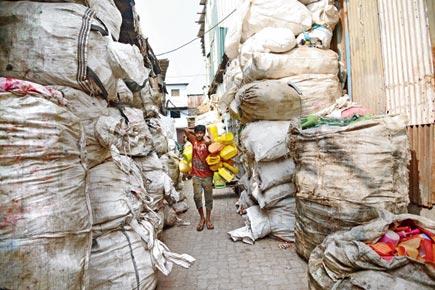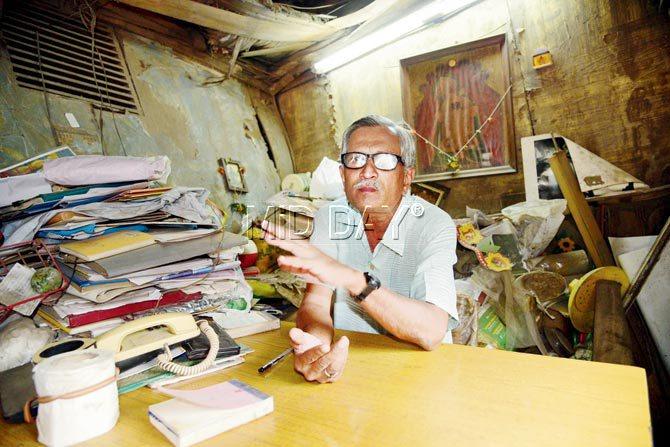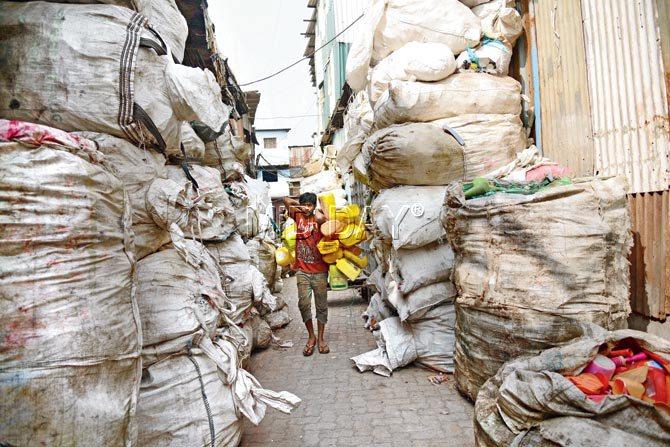With people refusing to give change, cash-strapped raddiwalas in Mumbai have decided to stop collecting old newspapers and plasticware from homes for a while; some paper mills close


ADVERTISEMENT
The worst hit are the raddi collectors, who make money on the basis of the amount of waste they collect. Pic/SureshKarkera
You may have to make more room for piles of waste in your house, as your local raddiwala is not going to take this burden off you anytime soon. With the shortage of notes in smaller denominations, most raddiwalas in the city have decided to stop collecting old newspapers and plasticware from homes for a while.
The new development has hit the slum pocket of Dharavi hard as it houses the maximum number of raddi warehouses and plastic recycling plants. Their business has dropped by almost 80 per cent, sources said.
Chain reaction
A local raddi collector, usually hired by the warehouses, first picks up scrap from homes. The raddi that is collected is then given to the paper mills. However, after the withdrawal of the old Rs 500 and Rs 1,000 notes last week, raddiwalas haven’t been able to pick up raddi for want of change. "We've been sending our boys out with Rs 2,000 notes, but nobody has change for it. With an economy that runs entirely on cash, it has become impossible to deal with this sudden withdrawal of old notes,” said Shirish Jani of S. Upendra and Co, a raddi warehouse in Dharavi that has a turnover of Rs 1 lakh a month. This month, Jani expects to make just around Rs 20,000.
"One woman said she would keep the Rs 2,000 note and I’d have to collect raddi from her till the entire amount was exhausted. If I give away my Rs 2,000 note, what will I eat?," added Jani. A paper mill in Vapi is already planning to shut shop due to this untimely development. Speaking on condition of anonymity, the co-owner of the paper mill in Vapi, said, "It's true that I might have to shut down my mill this week due to the lack of raw materials. We also need to pay the middlemen cash, which we can’t do at the moment."
Front line soldiers
The worst hit in the raddi chain are the raddi collectors. Nineteen-year-old Amarnath Dubey from UP, who has been tirelessly going from door to door with notes of Rs 2,000 every day, said people do not have any change to give him. "For us, our entire income depends on raddi. If we don’t collect the money from the public, how will the warehouses pay us?,” added Dubey.
Ashok Pandeyala, who collects and segregates plastic in Dharavi, says he hasn’t eaten properly since the currency withdrawal. “I used to make around Rs 2,500 every day, and now I’m not sure if I can even make Rs 250 daily."

Abdulla Sheikh, who has a plastic segregation business in Dharavi, has been eating just one vada pav a day so that he can save money for the next few months. "I have no money in my account to withdraw. We survive on the cash that we get from plastic recycling plants, but with no plastic in hand, where do we go?," asked Sheikh.
Raising environmental concerns, Stalin Dayanand, environmentalist and founder of NGO Van Shakti said, “Eventually, this problem will escalate and people will start dumping the plastic in municipal bins. This will turn Mumbai into a plastic dump yard, which is going to be harmful for the environment. I urge the government to address the problem immediately or be ready to face some serious consequences.”
 Subscribe today by clicking the link and stay updated with the latest news!" Click here!
Subscribe today by clicking the link and stay updated with the latest news!" Click here!






